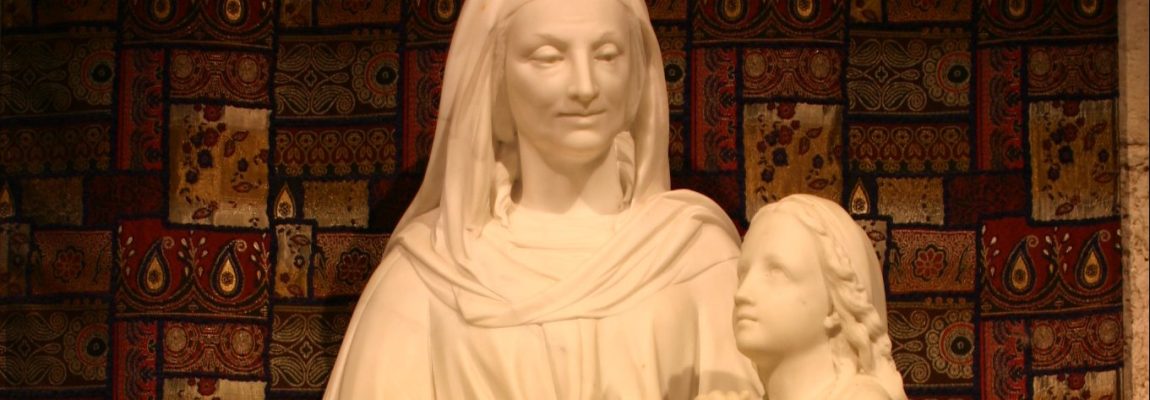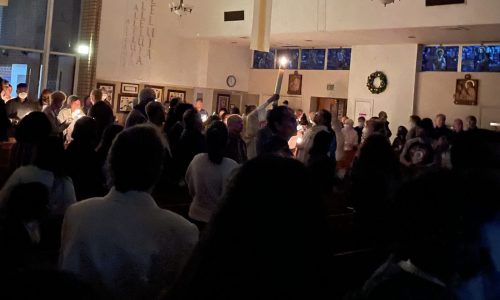by Sister Diane Heiss, SDSH
Photo of St. Anne and Mary taken by a Sacred Heart Sister in the Church of St. Anne in Jerusalem
Perhaps many of us are familiar with the song “Oh When the Saints Go Marching In … I Want to be in That Number …” While it is a lively song and easy to sing, there is an important question to consider: how many of us genuinely want to go marching into heaven and be saints? Do we truly live in a way that will form us for heaven? Saints are human beings who are in heaven. Many are canonized (officially proclaimed to be in heaven and worthy of having their virtues incorporated into our lifestyles), while countless more are known only to God. In the Creed when we say, “I believe in the Communion of Saints,” we profess our belief in the special bond of love and union that exists among all believers: the saints in heaven, those in purgatory, and those of us alive now. The Saints understand our struggles and heartaches, for they experienced their own while on earth and are happy to support us with their prayers. Those in purgatory were not ready to go straight to heaven at death, and therefore God in his mercy and love provides an opportunity to complete this process afterwards. They can no longer help themselves to prepare, and depend on our prayers and sacrifices to help them, as well as the prayers of those in heaven. They also pray for each of us to complete our journey of life well as we continue to be formed into Jesus’ image and likeness.
Sometimes people of other faiths have difficulty in understanding why we as Catholics pray to saints, thinking that it is more important to pray directly to God. We do pray to God, AND in the same way that we enlist the prayers of others when we are in need (think of the prayer chains that many churches have) we also ask for the prayers of our brothers and sisters who are already in heaven. This is the same reasoning for praying to our Blessed Mother who is the greatest saint of all. When Jesus was dying on the cross, he gave her to us as our mother, and gave us to her as her children. (Jn. 19: 26 – 27) What good and loving mother would not want to help her child coming to her in need? Mary is not God, and we do not pray to her as God, but rather ask her motherly help and intercession in our time of need.
According to tradition, the Catholic Church has many patron saints, persons in heaven designated to bring our petitions for particular intentions to God, often due to special events in their lives. Each of these has their feast day, a date set apart in the Liturgical (church) year. For example, St. Aloysius Gonzaga is the patron saint of aids patients and caregivers; St. Joseph of Cupertino intercedes for air travelers; St Peregrine has a special place in his heart for cancer victims since he also suffered from it; St. Monica intercedes for mothers; St. Catherine of Sweden prays for pregnant mothers and those suffering miscarriages; and Our Lady of Guadalupe is patroness of the Americas.
Family Activities to celebrate the Saints:
*Attend Mass or visit churches named for your favorite saints.
*Read the lives of your patron saints.
*Compose a litany of your patron saints and those who inspire you. E.g., St. Joseph …Pray for us.
*Celebrate the feast (saint) day of your family members and friends.
*Find online coloring projects and crafts related to your children’s patron saints.
*Plan ahead to help your children dress as saints for Halloween.
*Have a special family prayer or celebration on different saint’s feast days. Here are a few upcoming ones to help you start. You can find a longer list at: https://www.usccb.org/resources/2023cal.pdf
July 3rd: Saint Thomas the Apostle
July 22nd: Saint Mary Magdalene (Faithful friend of Jesus)
July 25th: Saint James the Apostle
July 26th: Saints Joachim and Anne (Parents of our Blessed Mother and grandparents of Jesus)
August 15th: The Assumption of the Blessed Virgin Mary (Mother of Jesus)
August 24th: St. Bartholomew the Apostle



